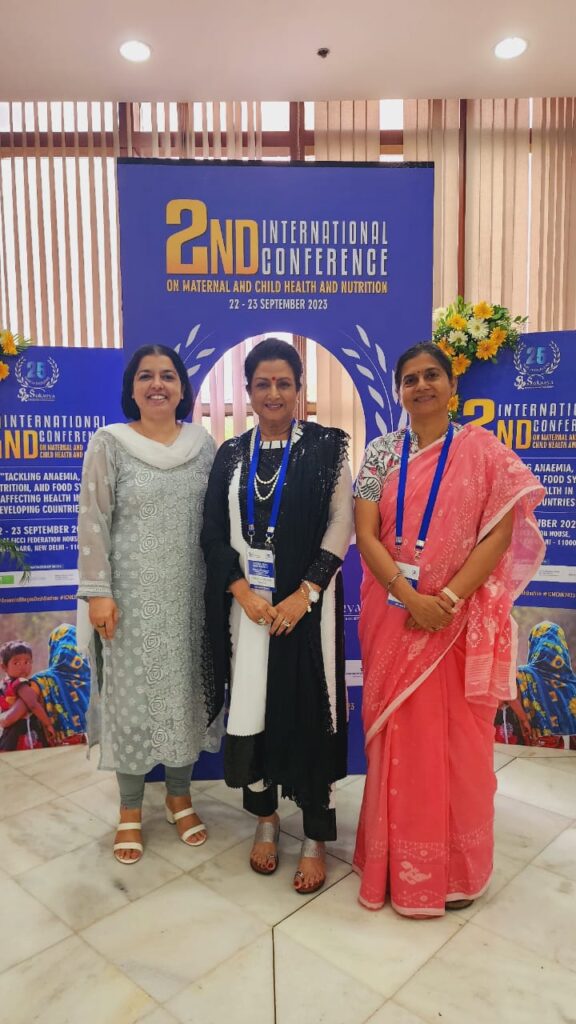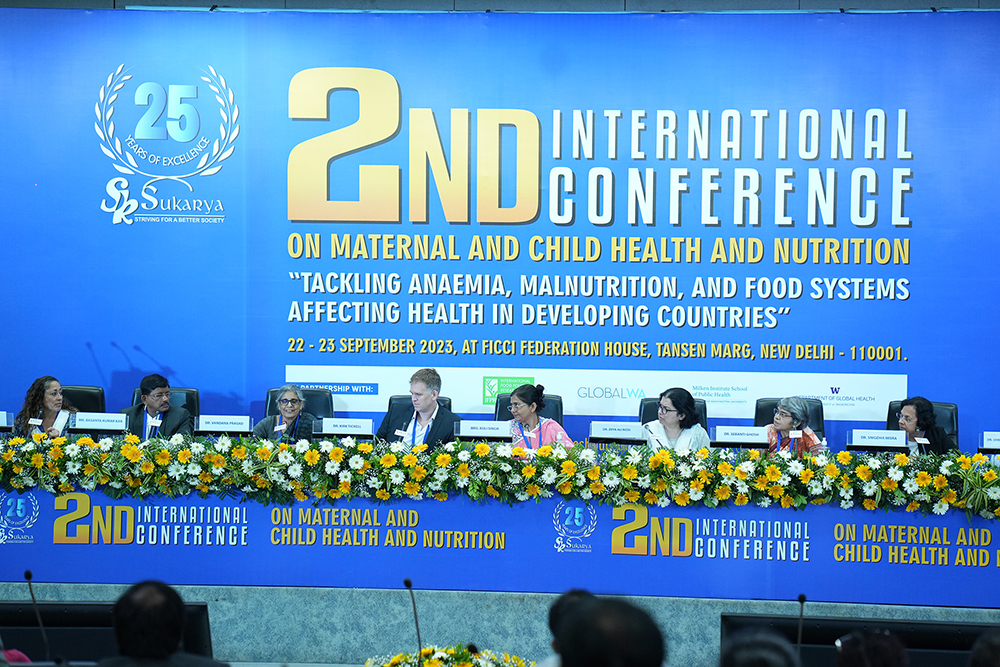International Conference
on
Maternal Child Health Nutrition
Tackling anemia, malnutrition, and food systems affecting health in developing countries: A Brief Note
22 – 23 September 2023
at
FICCI Federation House, Tansen Marg, New Delhi
Conference Partners
The conference was held in partnership with:
Knowledge Partners
- National Centre of Excellence and Advanced Research on Anaemia Control (NCEAR-A)
- International Food Policy Research Institute (IFPRI)
- Department of Global Health at University of Washington, Seattle WA.
Strategic Partner
- The Maternal & Child Health program at the Milken School Institute of Public Health at George Washington University, Washington D.C.
Global Community Partner
- Global Washington
Sukarya’s International Conference on “Maternal Child Health Nutrition: Tackling anemia, malnutrition, and food systems affecting health in developing countries” drew attention to the pressing issues of anemia and malnutrition, which continue to undermine the potential of children, women, men, families, and the entire society. More than 50% of women and around 70% of children in India are anemic. Although undernutrition rates are declining in India, stunting and underweight among children remains high. India is also facing the rising burden of overweight and obesity among children, adolescents and adults.
Anaemia Mukt Bharat (AMB) uses a 6*6*6 approach to decrease the prevalence of anaemia. Regardless of wealth quartile, anaemia is high. Hence, all wealth quartiles to achieve Anaemia Mukt Bharat. Eliminating anaemia can increase productivity significantly.
India is at par with global developments on science. However, resources are needed to apply this science for the benefit of all.
IFA coverage and compliance must be intensified. If pregnant women are iron deficient, iron will not be available to the infant and this will have lifelong neurological effects. Hence, we must prioritise actions on the first 1000 days from the time of conception.
Good nutrition has the power to transform the lives of present and future generations and address malnutrition. Diets in India lack diversity and essential nutrients. A balanced and diverse mix of vegetables, fruits, pulses, nuts, seeds, etc is needed. However, nutritious foods are not always affordable. Low-income households find it difficult to get healthy and nutritious food. Affordable foods are not always healthy. Access and availability of ultra processed foods, that have high fat, sugar and salt is easy and affordable. There is poor awareness of healthy foods, misinformation on social media and less focus on seasonal, local foods. Food control systems need to be strengthened. Eating behaviour is shaped by various forces such as family, culture, religion, social influences, economic influences and access. Poor water and sanitation facilities, and unhygienic practices lead to diseases and infections such as diarrhea. These also need to be addressed.
Socioeconomic drivers of poor nutrition and health need to be addressed, i.e., poverty, lack of access to education, lack of access to health care. A large proportion of our population cannot afford a healthy diet. Stunting, underweight are far higher in the poorest quintile. Poverty is the most important factor that underlies lack of access to maternal and child health and nutrition as well as gender gaps in access to them. There is a lot of scope for Government to intervene in making food nutrition sensitive. Right to life and dignity includes the right to food. Hence, we must expand PDS to include pulses and millets.
We also need to address issues of absorption by creating awareness of reduction of absorption of iron due to certain practices such as consuming tea or coffee after food. Or phytates in foods. Provide adequate budgets for programs like ICDS. Creches and day care centres can play a significant role in freeing the time of mothers and of siblings.
Campaigns can play an important role in enabling diversity in diets and provisioning in programs such as PDS, MDM, ICDS. Any growth faltering needs attention at the ground level and this requires that we build the capacities of Frontline workers. Simple protocols must be developed for nurses and ANMs, and not just for doctors, regarding what has to be done in high risk conditions. Vacancies among staff delivering critical health and nutrition programs must be filled on priority.
Further, guidelines and protocols must not be based on the lowest common denominator. Guidelines for health care in hospitals must cater to the full range of complications and all ranges of hospital capacity.
It is also critical to address the influence of advertising nutritionally deficient foods. Advocacy campaigns are needed for front of package labelling and warning labels on junk foods together with promotion of and support for health affirming behaviour. Games can be used as messages tools.
Maternal depression is a global public health issue and it is important to focus on postpartum depression. This is often ignored. Systematic training of workforce is needed to understand mental health.
Use multisectoral governance frameworks to identify factors affecting anemia and malnutrition so that we take cognisance of all the three domains – policy landscape in public health and nutrition; innovative and locally relevant solutions; as well as nature, nurture and nourishment.
Data and accuracy of data are critical if Artificial Intelligence is to be useful for the country. AI is a paradigm shift in programming but it can only predict based on data that is provided. There are significant challenges of diagnostic errors, privacy and security, quality, bias, interoperability, regulation and governance and these must be addressed.
We must realise that we are not the only beings on the planet. We have to see the world as an interconnected system. We need sustainable food systems. Investing in public health and nutrition is investing in the future. We must avoid silos and promote a cross sectoral holistic approach.














Link for the Concluding Notes of the Conference : https://icmchn2023.org/concluding-notes/
Link for the Conference Videos : https://icmchn2023.org/videos/
Link for the Conference Photographs : https://icmchn2023.org/photographs/
